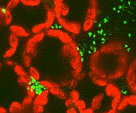Plant Pathology, Department of

Department of Plant Pathology: Faculty Publications
Document Type
Article
Date of this Version
10-1-1990
Abstract
The new biology has come of age. Basic research in fields ranging from immunology to plant biology has been transformed so as to be almost unrecognizable to those whose biology education ended before 1970. The spillover into commercial development likewise has been remarkable. Hardly a week passes without news of some new advance in an area such as therapeutics, vaccines, or plants and animals for food, feed, or fiber. These uses of biotechnology in "contained" laboratories, pilot plants, greenhouses, and production facilities have engendered little controversy. The National Institutes of Health Guidelines for Research Involving Recombinant DNA have exempted from oversight more than 95% of laboratory experiments (1); this has allowed organisms of low risk to be handled under modest containment conditions that permit large numbers of living organisms to be present In the workplace and even to be released from the laboratory. (2). Despite extensive work in thousands of laboratories throughout the United States with millions of individual genetic clones, there has been no report of their causing a human illness nor any injury to the environment. A bleak spot in this picture is tests in the environment, often termed field trials, planned introductions, or deliberate releases. A number have been subjected to extreme regulatory scrutiny and lengthy delays solely because recombinant DNA techniques were employed in the manipulation of the organism. This has occurred even when the genetic change was completely characterized, benign, and the organism demonstrably innocuous. The ripple effects have been substantial. Investigators have shied away from areas of research that require field trials of recombinant organisms (3); companies have felt compelled to eschew the newest, most precise and powerful techniques in favor of cruder but less regulated ones (4); and investors have avoided companies whose recombinant DNA-derived products require field trials (5).


Comments
Published in SCIENCE, VOL. 250, October 1990. Copyright 1990. Used by permission.